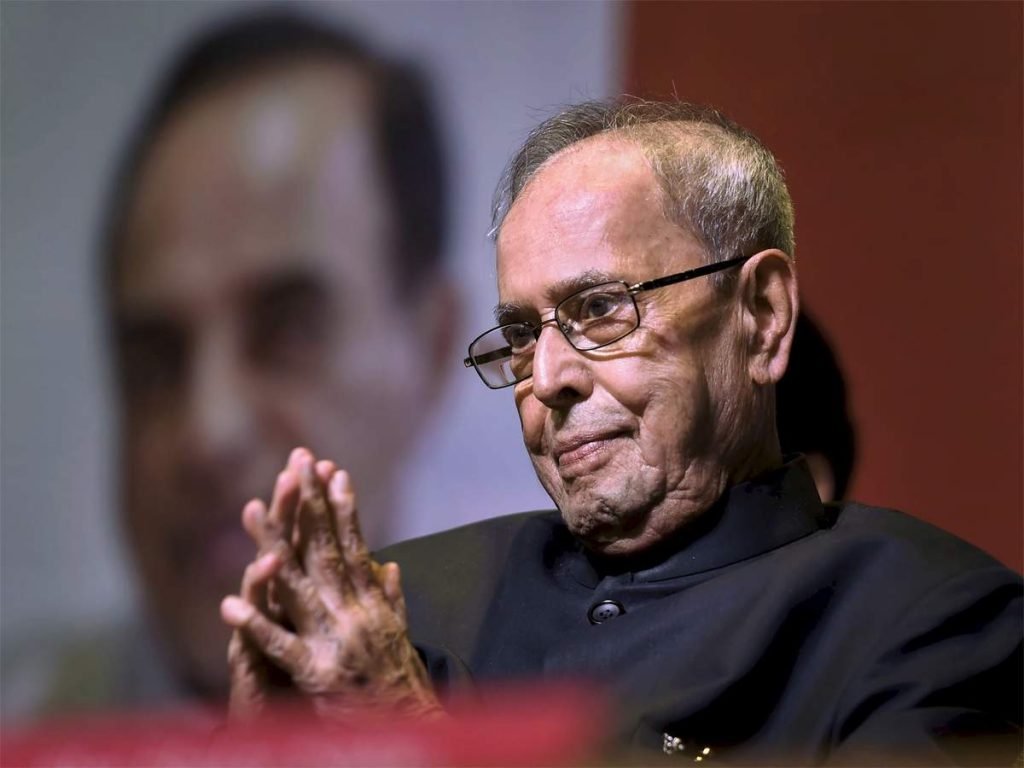New Delhi: The failure of the Congress to recognize the end of its charismatic leadership was one of the many reasons for the 2014 Lok Sabha elections debacle, according to former President Pranab Mukherjee, who found a shortage of exceptional leaders, establishing an “average government”.

Mr. Mukherjee made these comments in his memoir “The Presidential Years, 2012-2017”, which he wrote before his death last year. The book was released on Tuesday published by Rupa Publications.
In the book, Mr. Mukherjee mentioned that on the day of the results of the 2014 Lok Sabha elections, he instructed his aide-de-camp to be aware of the trends every half an hour.
When the results were announced in the evening, he was “greatly relieved at the decisive mandate, but also disappointed at my one-time party performance”. “It was hard to believe that Congress managed to win just 44 seats. The Congress is a national institution which is connected with people’s lives. Its future is always a matter of concern for everyone”.
The former Congress leader and Union Minister attributed the defeat to several reasons.
“I think the party failed to recognize the end of its charismatic leadership. Longstanding leaders like Pandit Nehru ensured that India, unlike Pakistan, survived and developed as a strong and stable nation. Unfortunately, such extraordinary Leaders are no longer, undermining the establishment. For the average government, “he wrote.
According to Mr. Mukherjee, when he saw his years as President, he gained satisfaction not only from the fact that he followed the rulebook in letter and spirit in dealing with the issues of governance and the day but also because He never veiled from it. Constitutional parameters have been set for an Indian-dominated state.
He wrote that he had very cordial relations with Prime Minister Modi during his tenure. He also wrote that Prime Minister Narendra Modi did not discuss the issue of demonetisation with him before his announcement on 8 November 2016, but it did not surprise him as such declarations were suddenly necessary.
“However, we did not hesitate to give our advice on matters of the policy during our meetings. There were many occasions when he expressed concern that I had given a voice. I also believe that he is quick to understand the nuances of foreign policy Have managed. ” The book said.
Mr. Mukherjee’s approach to maintaining a cordial relationship with PM Modi was rooted in the fact that “I believe in the parliamentary form of government and its doctrine”.
“Modi had obtained a decisive mandate from the people to operate the country. The administrative powers are vested in the Council of Ministers, which is the Prime Minister. Therefore, I did not violate my jurisdiction. Whenever difficult opportunities arise, the issues Resolved “. She wrote.
“At an event in which PM Modi released a book and I was present, I remarked that it was not that I had no differences with him, but that we both knew how to manage those differences, Without making them public.”
Mukherjee, however, said that the NDA government failed in its primary responsibility to ensure the smooth and proper functioning of the Parliament during its first term of 2014–19.
“I support the sharp exchange between the Treasury and the Opposition Bench for arrogance and disqualification by the government. But the opposition is also not without blame. It was also treated irresponsibly,” he wrote.
According to Mukherjee, the mere physical presence of the Prime Minister in Parliament overshadows the functioning of this institution.
“Be it Jawaharlal Nehru, Indira Gandhi, Atal Bihari Vajpayee or Manmohan Singh, each of these former PMs made their presence known on the floor of the House.
The book states, “PM Modi, now in his second term, should take inspiration from his predecessors and take inspiration from his predecessors to increase their presence in Parliament to avoid a crisis situation in Parliament.”
Mukherjee said, Modi should listen to dissident voices and speak more frequently in Parliament, adding that he should use it as a platform to explain his opposition and disseminate his views to inform the nation.
On foreign relations, Mukherjee felt that Modi’s stay in Lahore in India-Pakistan relations was due to “unnecessary and non-stop conditions”.
“It was clear that one could expect the unexpected from Mr. Modi as he came up with no ideological foreign policy paraphernalia. He had to continue with these surprises: he greeted his then Pakistani in Lahore in December 2015 The sudden and non-stop counterpart to, Nawaz Sharif, on the latter’s birthday; and he launched an annual informal summit with the Chinese president – one held in Wuhan, China in 2018 and the other recently in Tamil Nadu In 2019 in Mamallapuram. “
Mr. Modi did not discuss the demonetisation that would happen to him before making the announcement, Mukherjee wrote: “I am firmly pledged that demonetisation could not be done with prior consultation because of sudden announcements for such announcements And surprise was absolutely necessary. After such a process. “
“Therefore, I was not surprised when he did not discuss the issue with me before making a public announcement. It also fit with his style of making a dramatic announcement,” he said.
However, after delivering his address to the nation, Modi met Mukherjee at Rashtrapati Bhavan and explained to him the rationale behind the decision.
“He sought clear support from me as a former finance minister of the country. I told him that while this was a bold move, it could lead to a temporary slowdown of the economy. We have to take extra precautions to be less careful.” The suffering of the poor in the medium to long term, ”Mukherjee said.
“Since the announcement was made in a sudden and dramatic manner, I asked the PM if he had ensured that there was enough currency for the exchange,” he said.

